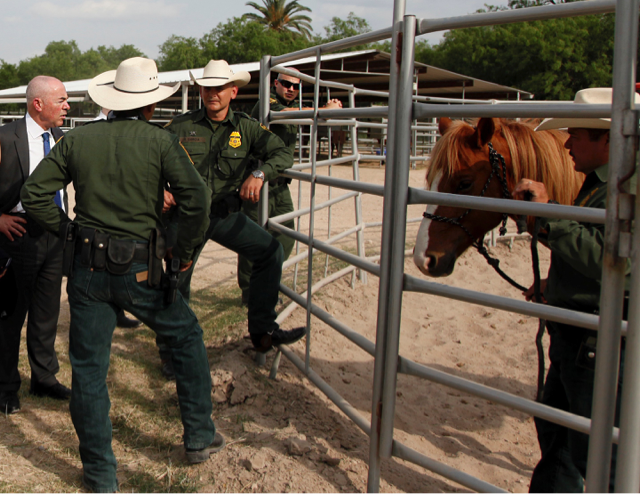I sometimes stumble across interesting things while researching and writing about U.S. immigration law for my day-job. Yesterday, I was researching a question about whether contract employment for the United States government is qualifying employment for the purpose of expedited naturalization. As part of my research, I performed a search on Westlaw looking for references to the term “under contract.” Among the results returned was Title 8, Section 1555 of the United States Code, which covers of all things, appropriations for horses for officers of the immigration services. I will first examine the statute before discussing the continuing importance of horses to the Department of Homeland Security in the form of the U.S. Customs and Border Protection’s Horse Patrol.

An Equine Appropriations Statute
Below, you will find 8 U.S.C. § 1555, reprinted in its entirety. I underlined the pertinent portion of the statute about horses for your convenience.

8 U.S.C. § 1555 was codified on July 28, 1950, two years before the codification of the Immigration and Naturalization Act of 1952.
The statute guarantees appropriates to the “Immigration and Naturalization Service” for the hire of privately owned horses for use on official business by employees of the Service and workers under contract with the Service.
Astute observers may note that the Immigration and Naturalization Service no longer exists, having been broadly subsumed by the Department of Homeland Security. 8 U.S.C. § 1555 still reads “Immigration and Naturalization Service” because it has not been amended since it was enacted. A note on 8 U.S.C. § 1551 provides for replacing references to the Immigration and Naturalization Service with references to the Department of Homeland Security.
Thus, taking into account the change, the pertinent provision, 8 U.S.C. § 1555(a), is best understood as follows:
Appropriations now or hereafter provided for the Department of Homeland Security shall be available for payment of (a) hire of privately owned horses for use on official business, under contract with officers or employees of the Service…
8 U.S.C. § 1555(a) ensures that the good men and women of the Department of Homeland Security, and Department contractors, will have access to privately owned horses to undertake official Department business. While the statute is not often discussed and has not, to my knowledge, been the subject of any litigation, horses are still an important part of Department business.
U.S. Customs and Border Protection’s Horse Patrol
The United States Customs and Border Protection (CBP), which is a part of the DHS, maintains a Horse Patrol. It describes the Horse Patrol on its website:
The Horse Patrol Program is composed of skilled horse riders, trainers, and instructors. Horse Patrol Agents ride in challenging terrain, environmentally protected, and privately owned sensitive geographic locations. The Horse Patrol are the most viable, and, in some cases, the only option for the U.S. Border Patrol to enter into regions inaccessible by any other means of patrol, such as 4×4 vehicles or All-Terrain Vehicles (ATVs). Without the Horse Patrol, these areas would remain unpatrolled and susceptible to transnational criminal activity.
In a 2015 press release celebrating the opening of a new Horse Patrol facility in Rio Grande Valley, CBP noted that “[h]orses have been a part of the U.S. Border patrol since the agency was founded in the 1920s…”

On March 14, 2017, the good officers of the Horse Patrol found 340 pounds of abandoned marijuana near Ajo, Arizona. The CBP press release credited the ponies: “Horses allow agents to quickly reach remote desert areas inaccessible to motorized vehicles.” Had the Horse Patrol not made it there, that marijuana may well have made it up here to Brooklyn to be smoked and make our streets reek. There is more than enough of that here. Thank you, CBP Horse Patrol.

It is no surprise that CBP continues to add to the Horse Patrol ranks. On June 8, 2018, the Laredo Sector Horse Patrol welcomed five new recruits who successfully completed the five-week Horse Patrol training program.
Non-Pony Provisions of 8 U.S.C. § 1555
Beyond the equine provision, 8 U.S.C. § 1555 is not an insignificant statute. Its other parts provide for appropriations to pay noncitizen interpreters and translators, distribute textbooks to aliens at no cost to the aliens, pay aliens in immigration detention for labor, and, perhaps most significantly, cover expenses related to unforeseen emergencies “of a confidential character.”
8 U.S.C. § 1555(b), relating to interpreters, was the subject of a 2005 decision of the Supreme Court of the United States in Taniguchi v. Kan Pacific Saipan, 132 S.Ct. 1997 (2012), wherein Justice Samuel Alito wrote for a six-Justice majorlity holding that the statute did not cover non-oral translations.
The provision regarding payments to detained aliens for labor has been the subject of several published court decisions. The United States Court of Appeals for the Fifth Circuit held that the minimum $1.00 wage for labor performed by detained aliens was permissible. Guevara v. Immigration and Naturalization Service, 902 F.2d 394 (5th Cir. 1990). Just last month, the Fifth Circuit joined the Eleventh Circuit in holding that labor programs for detained aliens are covered by civil liability provisions in The Trafficking Victims Protection Act of 2000. Gonzalez v. CoreCivic, Incorporated, 986 F.3d 536 (5th Cir. 2021); Barrientos v. CoreCivic, Inc., 951 F.3d 1269 (11th Cir. 2020).
But Back to Horses…
I am not sure when 8 U.S.C. § 1555(a) is used, if at all, relating to the hiring of privately owned horses. For example, Horse Patrol funding may be appropriated through other means. But regardless of the significance or lack thereof of 8 U.S.C. § 1555(a), the statute served write about the CBP’s Horse Patrol here at The New Leaf Journal. Speaking for myself at least, I extend my gratitude to the hard-working officers of the CBP Horse Patrol, and their loyal steeds, for working hard in inhospitable conditions to protect our national security by working to keep our borders secure.